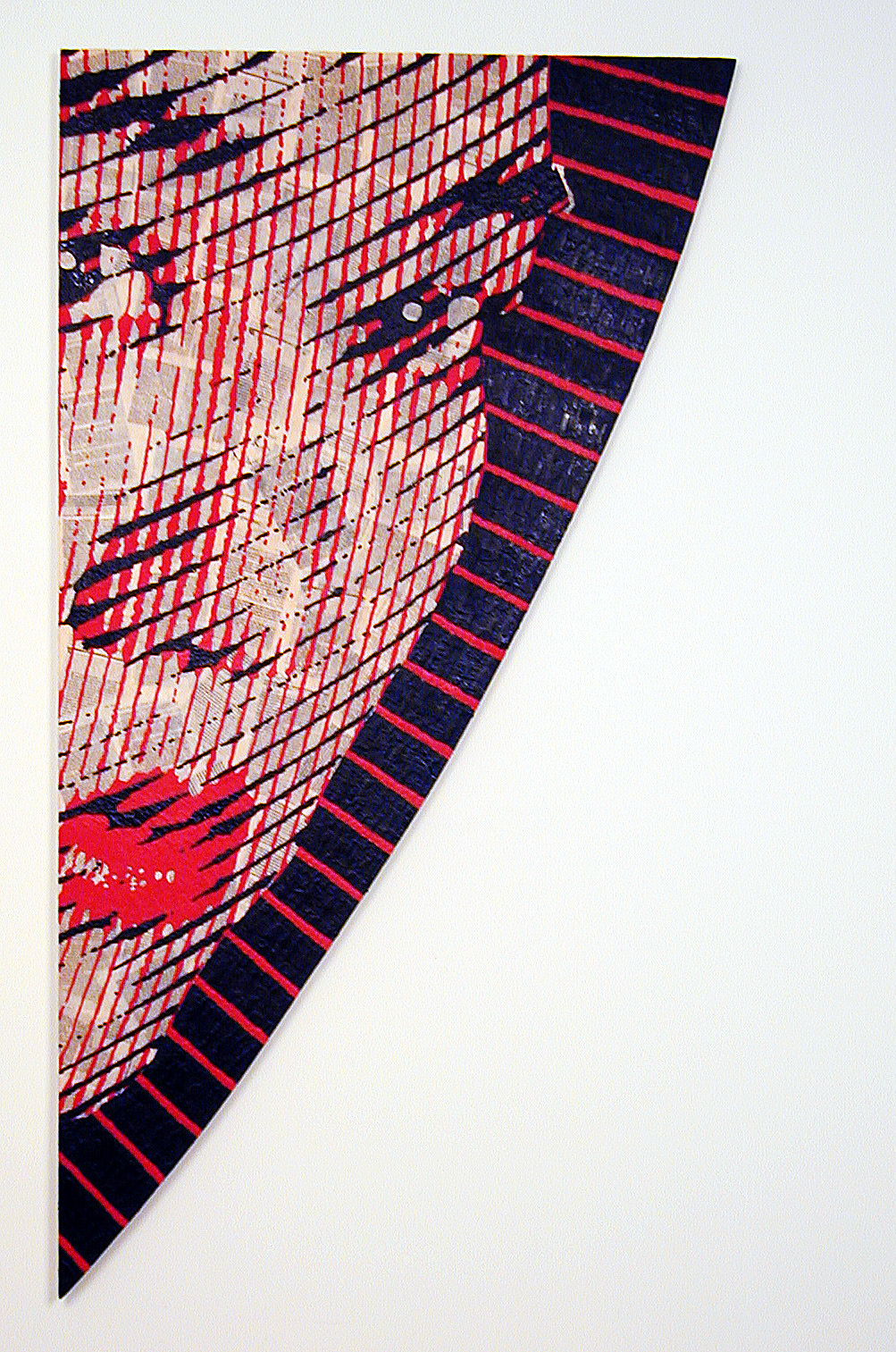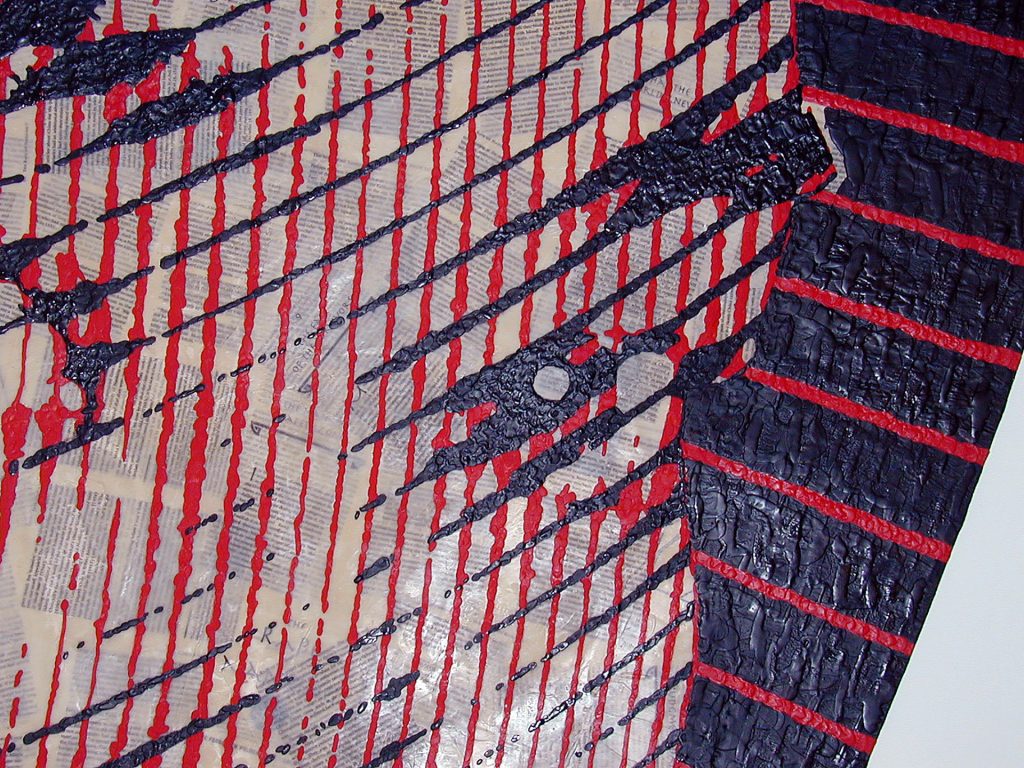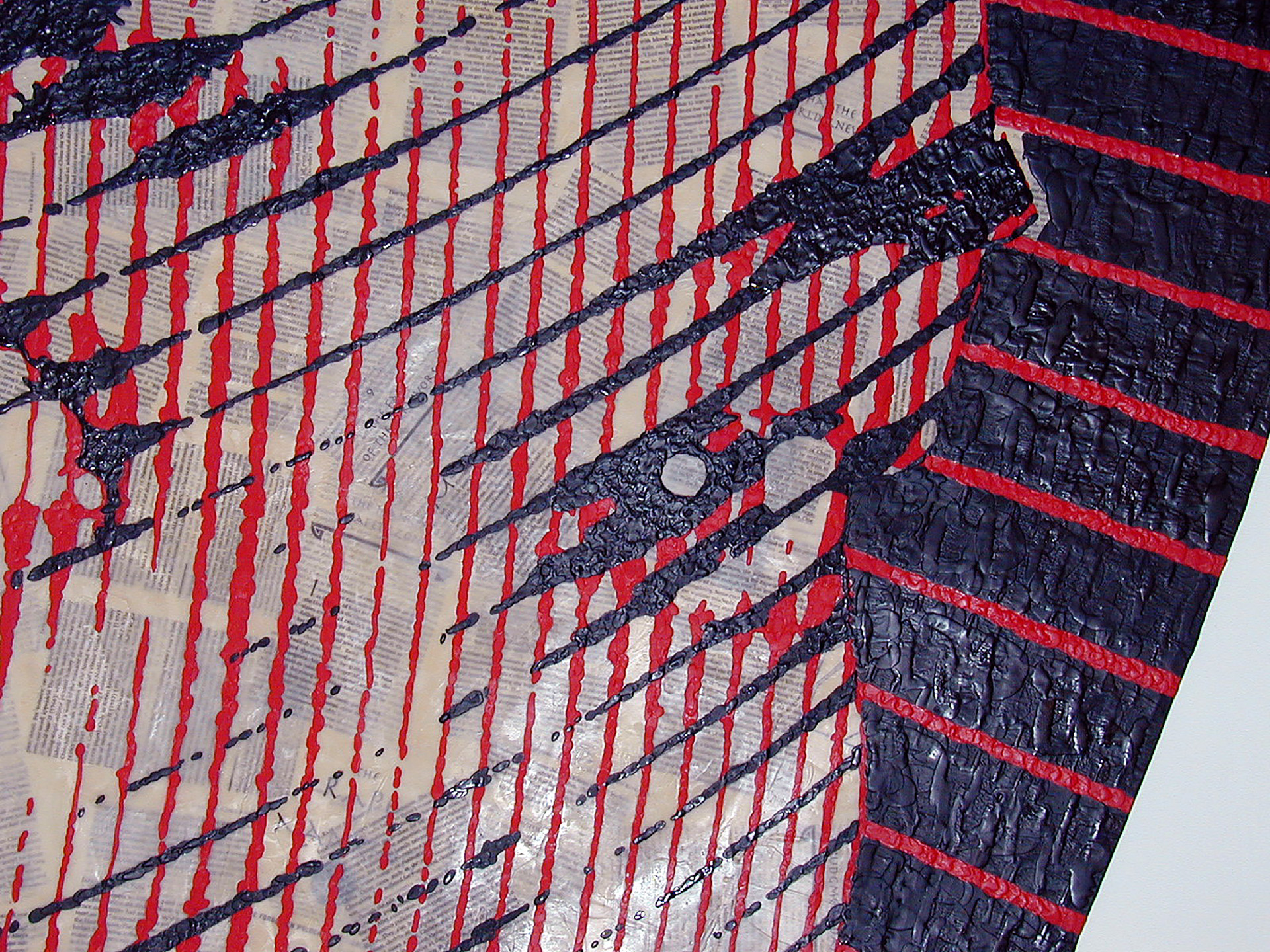Copyright, Creative Commons & Licensing Your Work
Table of Contents
Copyright Options
As artists you might like to make your work Copyright All rights reserved. You can set this on the About Page of your site, in your Site Footer, and also on individual works.
There are also Free Culture remixable variations on copyright that you may have some interest in, like Creative Commons. Creative Commons has a list of license options that let you give certain permissions to others.
Object & Image
When you make a 2D, 3D, or other thing, you own the object itself, and the reproduction of it. You could sell or give away one and still do something else with the other.

Iris, portrait of Iris Chang, author, encaustic & collage on wood, 81.5 x 44.25″, Creative Commons Attribution, 2000
Here’s a painting I made of the late author Iris Chang. It’s encaustic and collage on a shaped wooden panel. Physically the object is hanging in my living room, and I could sell, give, or trade the object to someone under any terms we agreed upon. The image of that object represented here I have labeled Creative Commons Attribution. This allows others to use my image. I’ve chosen a very Open license that gives away a lot of options. You could also choose a more Closed license that reserves more for yourself. There’s not a right or wrong here, but there will be a choice that intersects with your Creative, Financial, and Community interests.
Open & Closed
In the past there were really only 2 choices:
- Copyright All Rights Reserved
- Public Domain
You can’t get more “Closed”, than Copyright All Rights Reserved, and you can’t get more “Open” than Public Domain.
Copyright Today
BTW, these are the 2 defaults for works today. Currently, in the United States, the term of Copyright is the life of the author plus 70 years. So if you create a Painting, Song, Poem, or Luke Skywalker, say here in 2022, and let’s say you’re 20 years old today, and live to be 100, then the copyright on your creation would be 2022 + 80 + 70 = 2172. Your creative work will be under copyright until 2172 and I’ll have to pay you, or your estate, if I want to sing your song. If I want to rearrange your music, and you don’t like my arrangement, you can say no to my arrangement. If you don’t want my Luke Skywalker fanfiction out, you can block me from letting others read or view it. And if I don’t comply, you can sue me.
Then in 2172 your painting, song, poem, or Luke Skywalker enter into The Public Domain, and everyone can use them as they like.
This is a nice income protection for the creative artist. But 2172 is a long time for the rest of human culture to wait to be able to play with the Demoiselles d’Avignon or Harry Potter.
20th Century
The thing about Copyright back in your parent’s 20th century is that it didn’t affect that many people. It was mostly in the realm of Artists & Corporations, and most “mere mortals” weren’t really touched by copyright.
21st Century
Your century is different.
Today, pretty much everyone creates copyrighted works every day! And pretty much everyone has the occasion to respect or violate someone else’s copyright multiple times every day.
When the United States Congress extended the term of copyright to Life of the author plus 70 years, they did so at the behest of the Walt Disney Company because, without a copyright extension, Mickey Mouse would have entered into the Public Domain. Hence, some people refer to our current copyright regime as
The Mickey Mouse Protection Act
Well, Mickey Mouse is protected! And as artists, you might love the idea that you can control your creativity well beyond your grandkids’ lifetimes.
However, in your 21st century, we live in a fast, Internet-based Culture. Things move fast and securing a copyright release for “every breath you take” can be burdensome.
Glenn’s Art History Talks
A few years back I’d be preparing an Art History talk. I’d like to tell you that I was preparing it weeks in advance, but usually it was 1 or 2 nights before I had to give the talk. I’d search for images. Sometimes I’d use Flickr for example. Then I’d find some great image. It would be Copyright All Rights Reserved. So I’d email the author and ask for permission to use it.
Here are some of the replies you can get when you ask to use someone else’s work:
- Yes you can use it, no charge
- Yes you can use it, pay me a little bit of money
- Yes you can use it, pay me a lot of money
- No, you can’t use it
- No reply at all
As a poor CSULB faculty member just trying to give a talk in the next day or so, the only answer from the above list that really worked for me was #1.
Almost always, the answer I got was #5. They just never replied at all. But even if they had replied, say in a week, my talk would have already been over. Copyright really didn’t handle my situation very well.
If they’d set their work to, for example, Creative Commons Non-Commercial, then I’d already have permission to use their photos in my not-for-profit talk, and many days would be saved.
BTW, Flickr has Creative Commons license options, and it has a Creative Commons search option. So today when I want to use an image, I just set my search to never even show me the Copyright All Rights Reserved images. I only see images with CC licenses that I’m actually able to use!
New Options
Creative Commons come in 6 “flavors.” 6 options for licensing your creative work. The 6 flavors of CC fit in between the very closed Copyright All Rights Reserved, and the very open Public Domain.
Creative Commons Non-Commercial No-Derivatives is almost as closed as Copyright ARR, but it does allow someone to post your unmodified work on their non-profit website. And since that’s virtually inevitable in today’s world, why not accommodate it?
Creative Commons Attribution is almost as open as Public Domain, but it still preserves you as the author of your work. And it does something that no American copyright does, it asserts the Moral Right of Attribution: whatever people do with your work, they still have to cite you as the author of it.
End of Rant!
Whew! That’s a lot of talking by me! I hope you’re not bored/lost. I hope you’re still reading! If you are, maybe these 3 videos, 2 about Creative Commons, and 1 about the remix artist Girl Talk, will explain things better than I can:
Creative Commons
Wanna Work Together?
Wanna Work Together? from Creative Commons on Vimeo.
Creative Commons A Shared Culture from John Morrison on Vimeo.
Girl Talk
On the process of remixing culture.
Copyright on your website
OK. Apologies for all the theory. My point is that if I made a painting of Iris Chang, or if you created a photograph or illustration for a client, it could be that this initial use was your main activity, and you’re OK with letting someone work with images of your work after that.
Having said all that, I’m sure that Copyright All Rights Reserved will be the choice for many of you and that’s great.
Applying Copyright
Your work is already copyright as soon as you create it. You don’t have to register it in some way and you don’t have to mark your website in some way. Your Intellectual Property is owned by you as soon as you create it.
Still, you should probably put a copyright notice just to be even more clear to visitors:
- Add a Copyright All Rights Reserved notice on your About page
- Add a Copyright ARR to your site footer (many themes do this for you)
- Add a Copyright ARR to the image captions
And once you’ve done all that, be sure to have Contact Info so if someone is interested in your work, they have a way to ask you. Try not to be like all those Flickr peeps who never replied at all to my requests to use their pix in my talk.
Applying a Creative Commons License
Here’s 2 links. The first explains your options with the 6 different flavors of CC license. The 2nd is a form that lets you generate the text/code to paste on your website:

- A conversation with Iris Chang, 24 April 2004. (click to play, right-click and Save As to download)



Dear,Mr。Zucman,i am from Iris Chang studio. i know u from your blog:https://glenn.zucman.com/websites/copyright/ I want to buy your painting, or get an electronic version of this painting
.pls help me